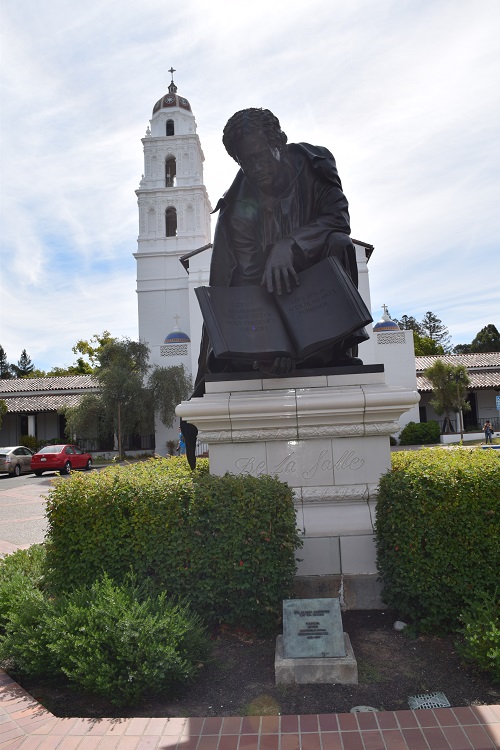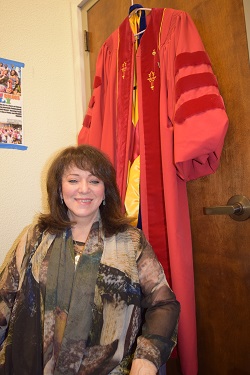
By Donald H. Harrison


MORAGA, California –Prof. Barbara McGraw of Saint Mary’s College of California likes to tell of an interfaith conference she attended at which delegates representing a wide spectrum of religious beliefs all were in attendance.
As was the custom at such gatherings, people in the audience asking questions first would identify themselves by name and by their religious affiliation. One man who identified himself as a “fundamentalist evangelist Christian” was himself asked a question by another member of the audience. “Isn’t it true,” he was asked, “that you think all the rest of us will go to hell? Isn’t that your thinking?”
The man responded: “Actually I do.” Everyone laughed or gasped and the man added: “But I think there is a hell of a lot that we can do together to make the world a better place while we are here.” According to McGraw, the man then received massive applause.
McGraw, who is director of Saint Mary’s Center for Engaged Religious Pluralism, said she likes to tell that story because it is an example of interfaith work.
“It totally isn’t about what happens in the hereafter, or what God is, or what our theological beliefs are,” she told me. “It’s all about our coming together and figuring out what we can do together with dignity and respect toward everyone to work for a more peaceful and better world.”
One of the initiatives with which McGraw was involved was the creation of a minor in interfaith leadership in this small college’s School of Economics and Business Administration. She said there is research that “When people work together for a common goal they develop a super-ordinate identity– so I may be Jewish, Muslim, Christian, or whatever, but I also have a super-ordinate identity of being a pluralist because I can work with everyone together. I can understand them and respect them, not because we agree on everything but because we work together.”
Interfaith leadership in the world of business, she said, involves “people doing business projects together, for the good, with profit, that really enhance people’s lives and make things easier, such as bringing water to people in India. When business people are trained to be interfaith leaders, we can bring interfaith cooperation and understanding to the people and that super-ordinate identity can be fostered as well.”
Saint Mary’s, located in the town of Moraga, is a Catholic university that dedicates itself to “the core Lasallian principles of social justice, faith in the presence of God, respect for all persons, inclusive community, and quality education,” according to the website of the 420-acre campus which serves nearly 4,000 undergraduate and graduate students. “Lasallian” refers to the order of lay brothers founded in the late 18th century by St. John Baptist de la Salle, “who devoted his life to the ministry of Christian education, especially for the poor.” A statue of him is a dominant feature of the campus.
McGraw, who herself is a Unitarian Universalist, estimated that Catholic students comprise about 60 percent of the student body, with a range of other faiths, including Judaism, accounting for the other 40 percent. An Introduction to Judaism course is taught by Rabbi Harry Manhoff, who is a pulpit rabbi at Temple Beth Sholom in San Leandro, California. One of McGraw’s student interns, Cabrilla McGinn, is Jewish. One project that McGinn took on, illustrating the sense of pluralism on the campus, was a panel which explored the reactions of Muslim and Sikh students to American life in the age of the War on Terror. Muslims as well as Sikhs, who often are mistaken for Muslims, have often encountered hostility from Americans ever since the 9-11 terrorist attacks of 2001.
The center director noted that one of the panelists was a “Muslim woman who wears a hijab and she had someone accost her and yell at her on the subway,” McGraw recalled. “And the thing that shocked her was not that it happened but no one came forward on the subway to help her.”
“I thought here is a great example of true interfaith collaboration: a Jewish woman bringing these folks together to have this conversation,” McGraw said.
Asked about issues that embroil other college campuses, such as the Israeli-Palestinian dispute, McGraw said that whereas some people have strong opinions on either side of the issue, discussions at Saint Mary’s College have been congenial.
Although strife among religious communities in various parts of the world always is in the news, little of that strife is experienced on this sheltered campus shaded by numerous trees, according to McGraw.
A greater concern for her personally, she said, is getting students to feel comfortable discussing their religious beliefs in a public setting.
McGraw suggested in our interview that the reason for the students’ reluctance is that “there has been a strong cultural dimension around what we call ‘secular.’” However, she said, it is fallacy to think that society can neutralize conflicts “by suppressing them under a false overlay of secularism.” In fact, she said, “in the research I’ve done, the original idea of secularism never had to do with people not being who they are in the public square. But in the 20th century that became kind of a trend.”
She said that “there is more of a tendency for conflict to arise when you suppress people around their religious identity. A better approach is what we people in this area call ‘pluralism,’ which isn’t just religious diversity; it is the engagement of people in their deep commitments. And it is also valuing that people have different identities. Valuing pluralism is a way of making the world a better place from various perspectives.”
*
Harrison is editor of San Diego Jewish World. You may comment to him at donald.harrison@sdjewishworld.com